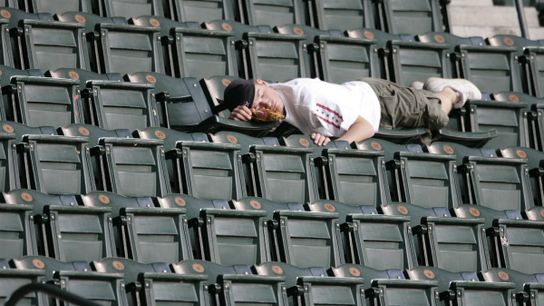Ben Cohen of the Wall Street Journal published a piece that we've all been thinking throughout September: college football games frequently take forever to complete. Sadly, that's only a slight exaggeration. You may have your own examples, but the epidemic crystallized for me during Saturday's LSU-Syracuse, as a game between two teams that threw only 54 combined passes still spilled over its 3 1/2-hour broadcast window.
The average college football game now lasts three hours and 20 minutes, down two minutes from last year's record but up 12 minutes from 2008. Seven years ago the typical college football game lasted only four minutes longer than its Sunday counterpart. The gap has now grown to 13 minutes.
Cohen perfectly summarizes the data here (emphasis added):
It isn’t just that the typical game ends a few minutes later. What makes it worse is that a growing number seem like they’ll never end at all. Already this season, there have been 66 games that lasted for more than 3 hours and 30 minutes, and six epics that passed 4 hours. Ole Miss’s marathon win over Alabama on Sept. 19 was only the latest example. That game kicked off at 9:21 p.m. ET and finally ended 4 hours and 5 minutes later at 1:26 a.m. ET. It didn’t go to overtime but was still longer than the extended cut of “Gone with the Wind.”
College games seem to be even more of a grind compared with NFL games. This year, the average NFL game has taken 3 hours and 7 minutes, a number that hasn’t changed dramatically over the last two decades. Last year, only eight games lasted longer than 3 hours and 30 minutes, and none went above four hours. Since 1996, in fact, only four NFL games broke the four-hour mark—a total that college football has already eclipsed this season.
The difference between the college and NFL games becomes obvious when they’re on television against each other. Thursday’s college game between Cincinnati and Memphis started at 7:32 p.m. ET and ended at 11:39 p.m. ET. That was six minutes before the end of Giants vs. Redskins—a game that had kicked off almost an hour later.
The last point is most startling to me. More college football games have run four-plus hours in the past month than the NFL has had in the past 19 years.
It doesn't take an expert to see this is an issue that needs fixing - quickly. The easiest solution would be to alter timing and procedural rules, stuff like running the clock after first downs, limiting the number of official reviews or returning to the drastic timing rules adopted for the 2006 season (where the game clock started with the play clock at every change of possession) and quickly abandoned thereafter.
But many in college football (rightly) resist any rules that would make the game more similar to the NFL, and each of those would only compromise the product on the field.
Clearly, this is an issue television created, and it's one television will have to fix. Four television timeouts per quarter, plus breaks for official reviews and injuries, have pushed the average game beyond the 200-minute mark. This, in turn, bleeds into another major issue facing the college game - attendance - as standing for minutes on end multiple times per quarter only makes attending a game in person less appealing.
How, exactly, the college football establishment pushes back against its television partners remains an open question. Networks don't give away billion-dollar contracts without wanting something in return. (And, if I may argue against my own point for a moment, it's not as if NFL games are light on commercials, either.) Perhaps networks could reduce the number and/or length of breaks and then charge a premium for its now scarcer product. Though I suspect if it was that easy, it would have already been done.
But it's in everyone's best interests - networks, conferences, fans - to fix the issue now before it starts driving potential customers away.
